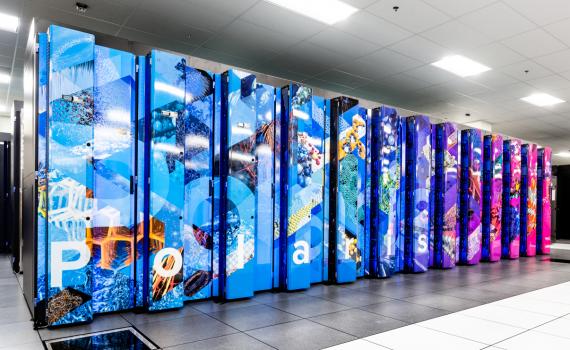May 1, 2024
By Kimberly Grasch
 Image: Argonne National Laboratory
Image: Argonne National Laboratory
The Research Computing Center (RCC) is the inaugural participant in the pilot phase of the Argonne Leadership Computing Facility’s (ALCF) new Lighthouse Initiative. This initiative aims to build enduring partnerships with academic institutions and is designed to broaden ALCF's user base while actively engaging with the next generation of computing professionals.
“This partnership further strengthens our relationship with Argonne National Laboratory; broadening access for our faculty and research community to utilize Argonne’s powerful computational capabilities to pursue large-scale, transformational research,” said Vice Provost for Research and Professor Erin Adams.
Through this initiative, the RCC will assist faculty and researchers by preparing, porting, testing, and scaling applications for ALCF resources. RCC staff will also provide support on ALCF systems for qualified projects. One goal of this partnership is to aid and ease the transition to larger ALCF allocation programs, such as INCITE.
“The ALCF Lighthouse Initiative is an exciting addition to RCC’s suite of services and programs. It will not only prepare projects for using leadership-class computers but also allow support for faculty projects on a scale that would otherwise be unattainable with available computational resources,” said Associate Vice President for Research Computing and RCC Director H. Birali Runesha
Five faculty research projects have been selected for the pilot phase, including investigations into high-dimensional partial differential equations (PDEs), supply chains, cloud formation on planets, and hurricanes. Baris Ata, Sigmund E. Edelstone Distinguished Service Professor of Operations and Management at Chicago Booth, is leading a project that requires a large number of GPUs with large memory.
"Traditionally, solving high-dimensional PDEs has been computationally challenging due to the curse of dimensionality,” Ata said. “However, the integration of deep learning and backward stochastic differential equations has facilitated scalable computational methods for addressing certain classes of PDEs, albeit with a substantial demand for GPU capacity for high-dimensional solutions. Despite this requirement, this advancement marks a significant breakthrough, as it makes these previously intractable problems solvable."
The initiative also offers specialized training tailored for the University that will be facilitated by ALCF staff. Additionally, summer internship opportunities will be available at the RCC and Argonne.
“The Lighthouse Initiative at the ALCF lights the path from academia to national labs, sparking excitement for HPC among students and researchers,” said ALCF Director Michael E. Papka. “Our aim is to inspire and enable the next wave of scientific discovery.”
More information regarding this initiative can be found at our Lighthouse Initiative website, including the timing for the initial call for projects. ALCF’s Lighthouse announcement can be found here.